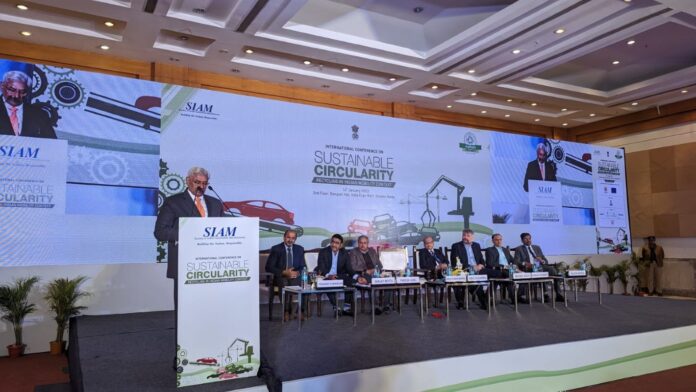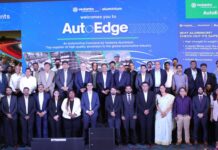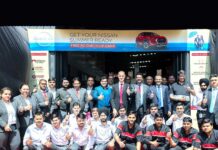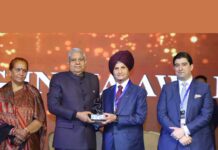
Society of Indian Automobile Manufacturers (SIAM), the apex automotive industry body today organized the International Conference on Sustainable Circularity in association with European Union: Resource Efficiency Initiative (EU-REI), themed “Recycling in Indian Mobility Context”. The conference witnessed participants discussing the way forward for achieving affordable sustainability aligned with policy changes and future of RVSFs & ELV recycling in the Indian context. The Conference aimed at bringing together Industry Stakeholders and Government representatives at the highest level to create a pathway to Circular Economy in India.
The inaugural session was themed “Recycling of Vehicle scrappage: A panacea for several ills”. Welcoming everyone at the conference, Mr. Rajesh Menon, Director General, SIAM, said, “Sustainable circularity is extremely important considering the size of the Indian market. From a sales point of view, India is ranked the third-largest economy for passenger vehicles. Decarbonisation, stringent regulations and technical norms for environmental protection, sustainable goals, fuel efficiency, and sustainable mobility are all aspects SIAM is looking forward to achieving.”
In the opening remarks, Mr. Vinod Aggarwal, President, SIAM and MD & CEO, VECV. He said, “Developing a circular economy and adapting alternative low emission fuels are the other two verticals of sustainability. The practise of recycling vehicles is expanding rapidly, and it’s anticipated that 2 crore vehicles would be recycled by 2025, furthering Atmanirbhar Bharat’s recycling objectives. This will not only promote employment growth but also optimize workers’ health and safety.”
Hon’ble Chief Guest, Mr. Arun Kumar Mishra, Chairperson, National Human Rights Commission of India and Former Supreme Court Judge & Former Chief Justice of Kolkata and Rajasthan High Court, unveiled the context paper and streaming of sustainable circularity (चक्रीयता) Initiative. He further added, “Restoration and Regeneration are two important requirements for sustainable circularity. To achieve sustainable development goals, a paradigm shifts from short to long term goals is essential. By applying sustainable circularity, we can save 25% more energy, contribute to 25% less industrial waste, 40% less air pollution, conserve 60% more water, and lessen greenhouse gas emissions by 44%.”
Mr. Paresh Goyal, Director, Ministry of Road, Transport and Highways, Govt. of India, said, “Vehicle recycling is crucial, and the government is addressing a number of concerns in this regard. Further, MoRTH has released a number of standards and guidelines to promote recycling. There is a need for licenced auto wrecking facility in order to fully utilise all materials and further minimise reliance on raw materials. Given that the development and implementation of policy is at a critical stage, timing is important.”
Mr. Sanjay Mehta, President MRAI and Director, MTC Group, said, “The circular economy is crucial for successful recycling and conservation of resources. Further decreasing the 8 million metric tonnes of steel which can be recovered and utilised will be the most effective aspect of the ELV scrappage policy”.
The session further included theme presentation by Dr. Michael Bucki, Head of Department at European External Action Service, he added, “We are working together and are finding opportunities for mutual learning in areas including electrification, dependency on the value chain and cost-effective technologies for sustainable living. In order to lower CO2 emissions, we require an open strategic anatomy for a sustainable tomorrow.”
Mr. Shrikant Deshmukh, Chairperson, SIAM Recycling Group and General Manager, Product Homologation – Certification and Regulations at Mercedes-Benz India Pvt. Ltd. and Mr. Prashant K Banerjee, Executive Director, SIAM, also shared the dais.
Technical session 1, themed “Maximizing India’s Vehicle Scrappage Benefits: Opportunities for Stakeholders”, was initiated by Mr. Arvind Nautiyal, Joint Secretary & Member Secretary, CAQM. The session included thematic presentations from Mr. Amrendra Kumar, Vice President, Re Sustainability Ltd, Mr. Surinder Kumar Gupta, Chairman & MD, MSTC & Chairman, MMRPL, Mr. Dhruv Goel, CEO, Steelmint, and Dr. Anand Kumar, Director, CPCB. Dr. Rashid Hasan, Sr. Advisor, SIAM concluded the session by summarizing the varied ideas about sustainability, and knitted the ideas for further effective policy making.
Technical Session 2, themed ‘Reduce, Reuse, Recycle: Scrapping ELVs for a cleaner environment’, was opened by Ms. Panchajanya Batra Singh, Advocate emphasized the idea of fostering innovations as a consequence of ELVs recycling. The session included thematic presentation by Mr. Sumit Issar, Managing Director, Mahindra Accelo & Director, Cero. Other panellists in the session included Mr. Arun Kapoor, Director, Technical and Marketing at Tinna Rubber and Infrastructure Ltd, Mr. Sujeet Samaddar, Ex-Consultant, NITI Aayog, New Delhi, Mr. Satyendra Kumar, Director, Ministry of Environment, Forest & Climate Change, and Mr. Ravi Agarwal, Director, Toxic Link, New Delhi. Concluding the session, Dr. Sandeep Garg, Dy. Executive Director, SIAM, summarised the ideas of the session focussing on specific responsibility to achieve circularity, and further added that the products should be designed in-lines with circularity principle.
The Valedictory session, themed ‘Harnessing the Potential of Automotive Recycling for Sustainable Development’, was opened by Dr. Rachna Arora (EU-GIZ), Project Director, EU-Resource Efficiency Initiative at Deutsche Gesellschaft für Internationale Zusammenarbeit (GIZ), Germany. The session included thematic presentations from Mr. Sauvik Bhattacharjya, Program Director, TERI, Mr. ALN Rao, CEO, Exigo Recycling Private Limited, Mr. Rajiv Ramchandra, Founder of Recreate India Research Foundation (Re: CREATe), and Mr. Yogesh Bedi, Chief, Urban Mining & Steel Recycling Businesses, Tata Steel. The speakers underlined the need for sustainability based on social, economic and environmental parameters.
The Session was concluded by Mr. Prashant K Banerjee, Executive Director, SIAM. He said, “In circular economy resource efficiency, it is very important to look from the vehicle designing stage. Channelizing the attention on fleet modernization, lets us follow a “CHAKR” strategy to ensure the development of circular economy in the nation.”






